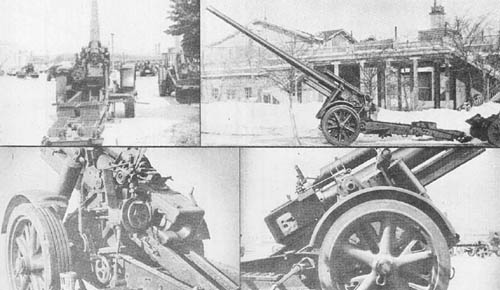
This weapon was being replaced by the 15 cm K. 39 during the closing months of the European war. For transport, the K. 18 may be broken down into two loads and drawn by either horse or truck.
The built-up tube consists of a main tube, breech jacket, and breech ring. Rifling is a 6° constant twist. Hydraulic recoil and hydropneumatic counterrecoil cylinders are of standard German design. The buffer is located below, and the recuperator above the piece.
A rectangular breech ring has a crank-operated horizontal sliding type breechblock opening to the right. Two pneumatic, push-type equilibrators are incorporated in the design.
Elevation and depression are accomplished by means of an off-center elevating arc which is operated by a handwheel on the left side of the piece. The traversing handwheel is also located on the left.
The carriage is mounted on two rubber-tired wheels and has a hollow, box-type trail allowing a total traverse of 12 degrees.
The ammunition is semi-fixed; there are three charges.
SPECIFICATIONS
| Caliber | 149 mm | |
| Weight (firing position) | 28,400 lbs. | |
| Maximum chamber pressure | 41,200 lbs./sq. in. | |
| Length of barrel | 323 ins. | |
| Twist of rifling, constant | 6° | |
| Length of rifling | 253 ins. | |
| Volume of chamber | 1,770 cu. ins. | |
| Muzzle velocity | 2,840 f/s | |
| Max. range (horiontal) | 27,000 yds. | |
| Traverse | 12° | |
| Elevation | 43° | |
| Depression | 2° | |
| Length of recoil | 1,450 mm | |
| Ammunition types | HE; anticoncrete | |
| Weight of max. charge | 42.5 lbs. | |
| Weight of projectile (HE) | 94.6 lbs. |
German: p. 104.3 (June 1, 1945)